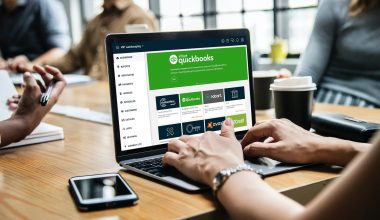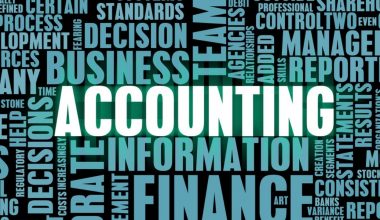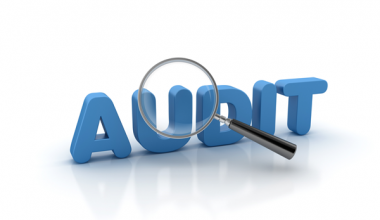Business accounting is essential for the launch of a small business, as it helps ensure its success. It may not be the most exciting part, but it is essential to start on the right foot.
We’ll go over everything you need to know about small-business accounting in this article, along with some of the best accounting software to take into account, allowing you to proceed to the next item on your to-do list for small-business finances.
What is business accounting?
Business accounting is the systematic collection, examination, interpretation, and presentation of financial data. In small businesses, one person may handle accounting; in large organizations, various teams may handle accounting.
Additionally, a business keeps a record of its operations through accounting. Accountants review the financials of the company so the owner can make wiser choices. Reports containing this information are created to display a company’s financial health. Finally, accounting enables business owners to fulfill their regulatory requirements. Additionally, it aids them in making wise financial decisions.
What Does a Business Accounting Do?
Business accounting is the method used by businesses to comprehend their finances. Without precise accounting, SMEs are unable to manage their cash flow, make wise financial decisions, or ensure tax compliance.
Furthermore, accounts can be managed internally by a business or externally by an accountant. It is always worthwhile to learn the foundational concepts of accounting to better understand your company’s finances, regardless of whether you decide to manage your accounts or not.
What are the Advantages of Business Accounting
#1. It helps you keep up with business records:
It systematically enters all financial transactions relevant to the specified year into the books of accounts. Due to their size and complexity, management is unable to retain every single transaction for an extended period.
#2. It helps in making financial statements:
If transactions are properly recorded, financial statements such as trading and profit and loss accounts and balance sheets can be prepared quickly. Note that the preparation of the entity’s financial statements depends heavily on the accurate recording of all financial transactions.
#3. It makes it easy to results compare results:
It makes it simple to compare the financial outcomes of one year with those of another. Additionally, the management can review the meticulous documentation of all financial transactions under the entity’s policies.
#4. It helps in decision-making:
The management’s ability to make decisions is facilitated by accurate financial transaction recording. Accounting data is used by management to coordinate activities across departments, plan for the future, and create budgets.
#5. Appraisal of a business
Accounting data can be used to determine how well an entity is valued. As a result, in the event of a sale of the entity, it aids in determining the value of the enterprise through the use of accounting information.
How Do I Start a Business Accounting?
#1. Open a small-business bank account:
A separate bank account for business protects personal assets in the event of bankruptcy, lawsuits, or audits. It is recommended for LLCs, partnerships, and corporations, and sole proprietors don’t legally need a separate account. Additionally, a business credit card is important for securing funding and financing large purchase orders in the future. To open a business bank account, you need a business name, which may have to be registered with your state or province.
#2. Track your small business expenses:
The foundation of solid business bookkeeping is effective and accurate expense tracking. Establish an accounting system for organizing receipts and other important records. There are five types of receipts to pay special attention to: meals and entertainment, out-of-town travel, vehicle-related expenses, gifts, and home office receipts. Additionally, starting a business at home is a great way to keep overhead low and qualify for unique tax breaks. Note that any expense that’s used partly for personal use and partly for business must reflect that mixed-use.
#3. Develop a bookkeeping system:
Bookkeeping is the day-to-day accounting process of recording business transactions, categorizing them, and reconciling bank statements. As a new entrepreneur, you need to determine how you want to manage your books. Furthermore, small business owners can use software like QuickBooks or Wave, an outsourced or part-time bookkeeper, or an in-house bookkeeper and/or accountant. Note that Canadians must use the accrual method, while US business owners can use cash-based accounting if revenues are less than $5 million.
#4. Set up a small business payroll system
Online stores need to establish whether an individual is an employee or an independent contractor. To do this, they need to set up a payroll schedule and withhold the correct taxes. For independent contractors, they need to track how much they’re paid and file 1099s at year-end.
#5. Investigate import tax:
Importing goods from other countries can be costly, especially if you run a dropshipping business. A duty calculator can help estimate fees and plan for costs. Therefore, visit the International Trade Administration for the USA or the Canadian Border Services Agency for more information.
#6. Determine how to get paid:
A merchant account is a kind of third-party payment processor like PayPal, Stripe, or Square that enables your company to accept customer credit card payments.
Additionally, fees differ if you work with a third-party payment processor. Some processors charge an interchange plus rate for each transaction, which is typically 2.9% + 30. While some have a monthly membership model for unlimited financial transactions, others have flat fees for each transaction.
#7. Establish sales tax procedures:
E-commerce has made it easier to sell to customers outside of a state or country, but it has also introduced confusing sales tax regulations that can cause headaches down the line. When a customer walks into a brick-and-mortar store, they pay the sales tax of the state or province in which they make the purchase.
Furthermore, US small businesses must determine if they operate in an origin- or destination-based state to charge sales tax. International purchases are tax-exempt for US-based businesses, so check in with an accountant for detailed information.
#8. Determine your tax obligations:
Tax obligations vary depending on business structure, with self-employed individuals claiming business income on their tax returns while corporations are taxed separately from owners. Additionally, it’s important to talk to a tax professional if in doubt, as it can save time and money.
#9. Calculate gross margin:
Improving your store’s gross margin is key to earning more income. To calculate it, you need to know the costs incurred to produce the product. Gross margin (%) = (revenue – COGS) / revenue. Note that the difference between how much you sell and how much the business takes home determines your ability to keep the doors open.
#10. Find high-quality accounting partners
As a small business owner, it is important to consider hiring a certified public accountant (CPA), a bookkeeper, a tax preparer, and a tax planner. Furthermore, a CPA is the only individual who can legally prepare an audited financial statement, while a bookkeeper manages day-to-day records, reconciles accounts, categorizes expenses, and manages accounts receivable and payable. Additionally, tax planners help you optimize your taxes before filing them, helping you learn ways to lower your tax burden.
11. Evaluate your methods often:
It is important to reassess the amount of time spent on books and how much it is costing the business. This is why learning accounting basics is important, even if you don’t plan on doing the accounting yourself. Note that the right bookkeeping solution can help the business invest more time in the business and potentially save money. Win-win!
Best Small Business Accounting Software
Check out the accounting software listed below that you could use to manage your books.
#1. Xero:
Xero is a cloud-based accounting system designed for small and growing businesses with advanced features such as inventory and stock management, affordable pricing, connections to major banks, easy-to-view and customizable reports, contact database and segmentation, payroll, and mobile app bank reconciliation.
#2. QuickBooks Online:
QuickBooks Online is a small business accounting software run by Intuit that can be used to track expenses, income, and sales. Additionally, it offers cloud-based mileage tracking, contract management, inventory tracking, and separate business and personal expenses. Benefits include a mobile app, cloud-based mileage tracking, contractor management, and inventory tracking.
#3. Wave:
For small businesses, Wave is a web-based accounting solution that enables users to link bank accounts, PayPal accounts, and other data sources to view real-time business transactions and produces reports. It has an unlimited number of users, free accounting, free receipt scanning, no transaction or billing limits, and an affordable and competitive price.
#4. FreshBooks:
A cloud-based accounting and invoice management tool for small businesses is called FreshBooks. It provides expense management, core accounting, and all the tools necessary to handle elementary bookkeeping. Benefits include simplicity of use, Shopify integration, straightforward pricing, adaptable invoices, and thorough self-service support. Choosing a tool that you will use for a long time and feel comfortable using is crucial.
Is Accounting in Business Hard?
Due to its intricate concepts and formulas, accounting is regarded as one of the more difficult college fields. For proper account regulation, a broad and deep understanding of accounting principles and procedures is needed.
Can I Do My Own Accounting For My Business?
It’s simple for business owners to handle their own accounting needs or rely on software because there are so many affordable accounting tools available. However, it may not always be the best strategy to handle your company’s accounting needs on your own.
Does Accounting Pay Well?
An accountant’s median annual salary is significantly higher than the national median for all occupations. The average annual salary for accountants is $77,000. Additionally, accounting professionals make the most money in the finance and insurance, business and enterprise management, tax preparation, and government sectors.
Is Accounting Math Heavy?
Accounting does not require rigorous math skills, but it does require knowledge of simple addition, subtraction, multiplication, and division, as well as some light algebra and introductory algebra. It’s not necessary to know calculus to be a good accountant. Therefore, accountants don’t need to be math wizards, but they should be interested in numbers and have a basic understanding of mathematics.
Does Accounting Require Math?
For a bookkeeper or accountant to succeed, math proficiency is not necessary. The confidence and aptitude to use decimals, fractions, and percentages, as well as to add, subtract, multiply, and divide, are what is required.
What is Small Business Accounting?
Small-business accounting is a set of financial procedures for handling, calculating, and communicating a company’s financial information. Note that taxes, management, payroll, and inventory are a few of these activities.
Examples of Small Business Accounting Software
#1. Sage 50 Cloud Accounting:
Sage 50 Cloud Accounting is a capable desktop accounting program for small businesses. Although it has built-in online connections and integrates with Microsoft 365 Business, the software’s outdated interface, lack of mobile access, and requirement for local installation prevent it from earning a higher rating.
#2. Zoho Books:
A component of Zoho’s productivity tools for small businesses provides usability, flexibility, and depth in typical bookkeeping areas. Additionally, small businesses, expanding businesses, and established businesses with more complex needs can all afford and use it.
#3. Intuit QuickBooks Online:
The best small business accounting service is QuickBooks Online, which has numerous versions, easy customization, add-on apps, and better mobile access. Furthermore, it is appropriate for small businesses with a budget for technology.
Can I get Business Accounting Courses Online?
The fundamentals of expert accounting are taught to you in several free online business accounting courses that can be found online. In these courses, you will learn about accounting, business, the account equation, and how to create a worksheet. Additionally, you’ll discover how to record data, edit summaries, and analyze transactions. Lastly, you will also learn about the accounting cycle, financial statements, the fiscal year, and other topics.
Small Business Accounting Course
Udemy and Coursera offer courses on small business accounting for beginners or refreshers. The course covers the same material as classroom training and is designed to provide a solid foundation in accounting. Additionally, after completing the video lessons, students can test their knowledge with comprehensive tests. This course can be customized to meet individual learning needs.
2023 Top Free Small Business Accounting Software (Updated)
WHAT IS THE ACCOUNTING EQUATION: Detailed Guide
WHAT IS EQUITY IN ACCOUNTING: Definition, How It Works & All You Should Know






